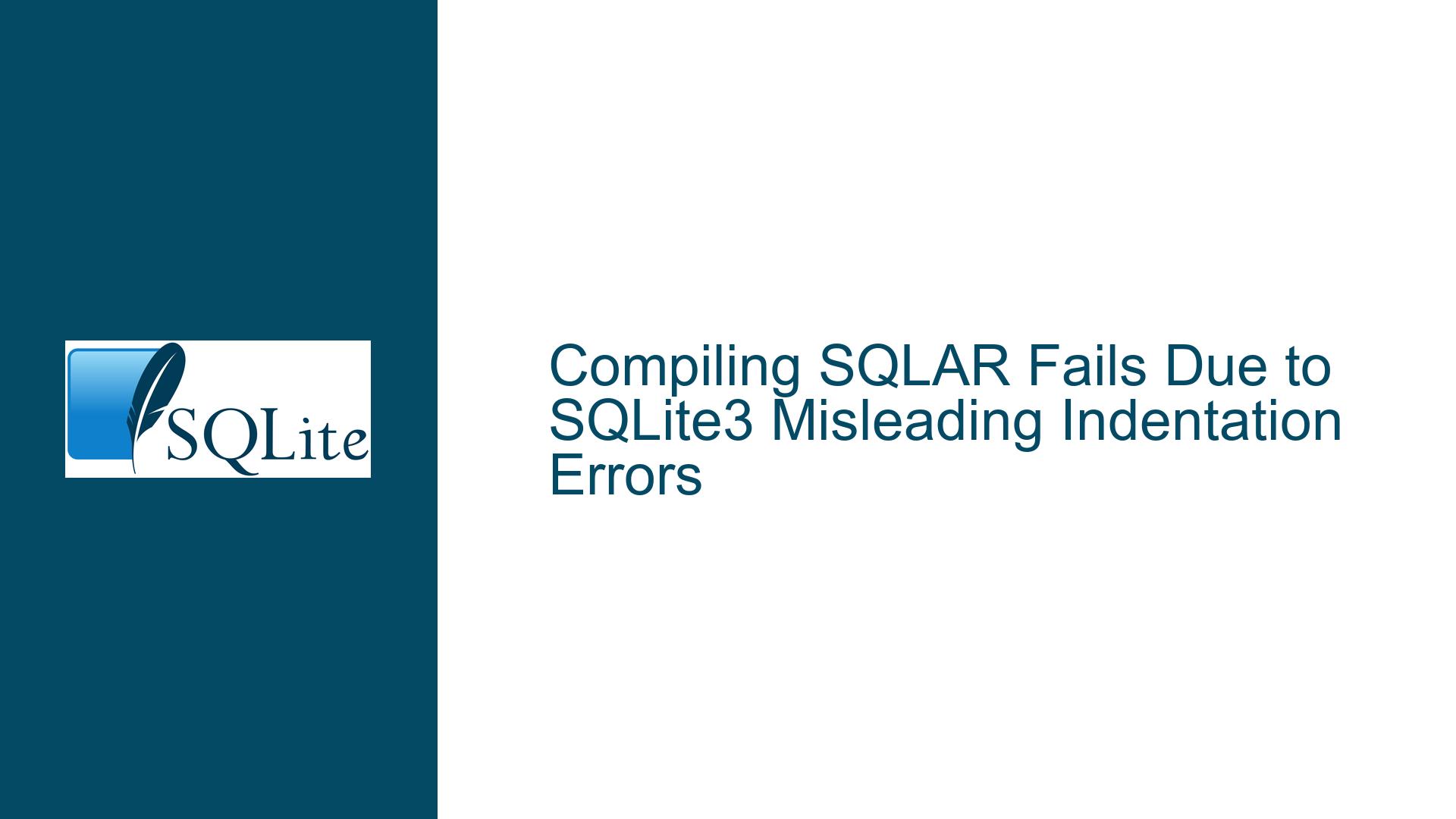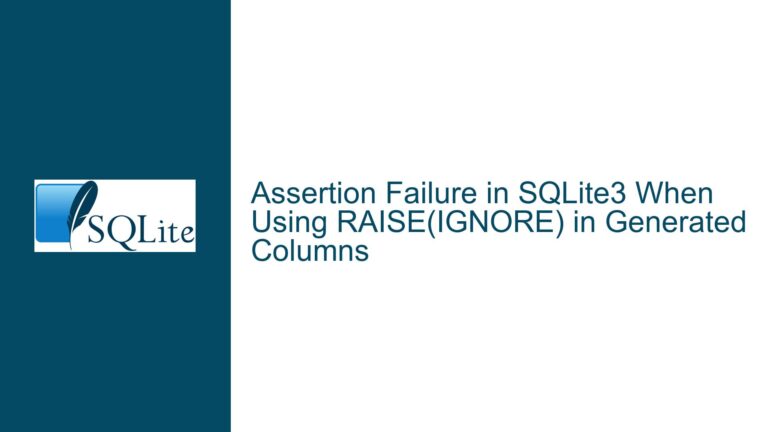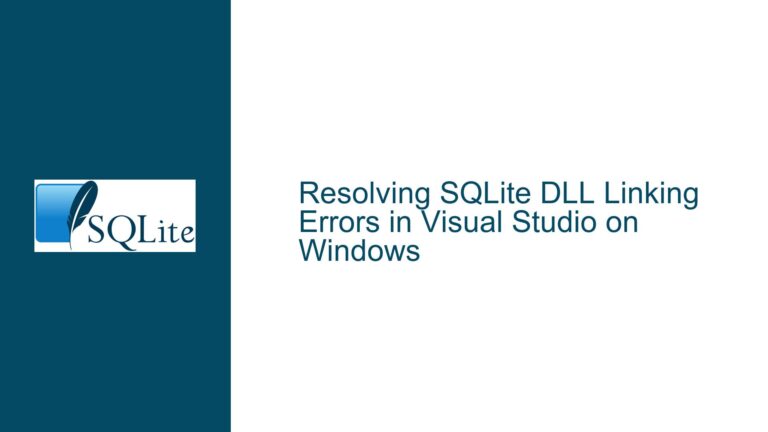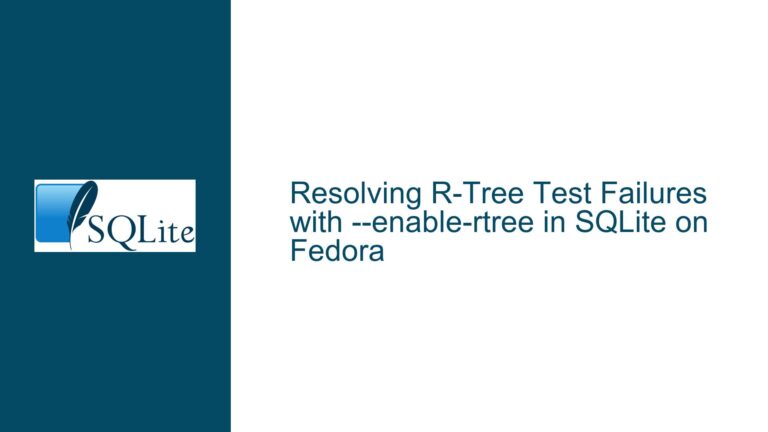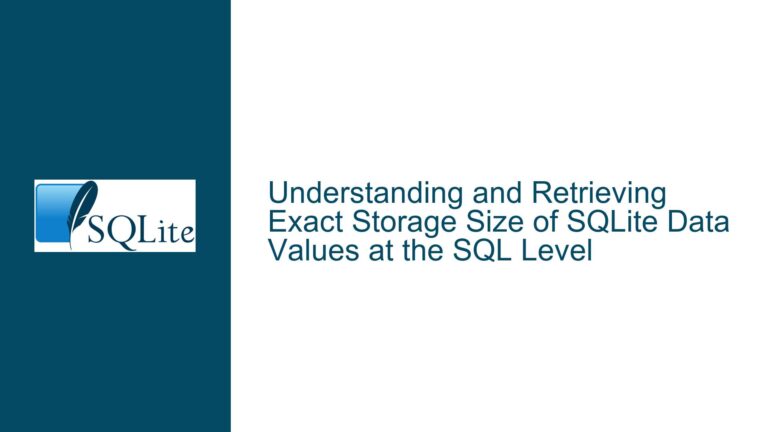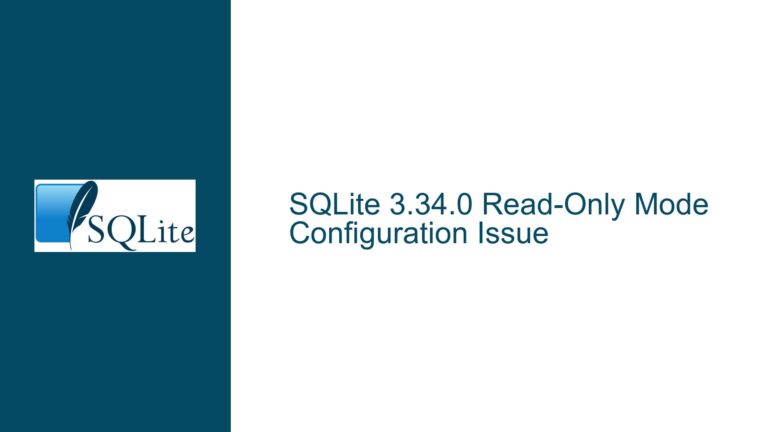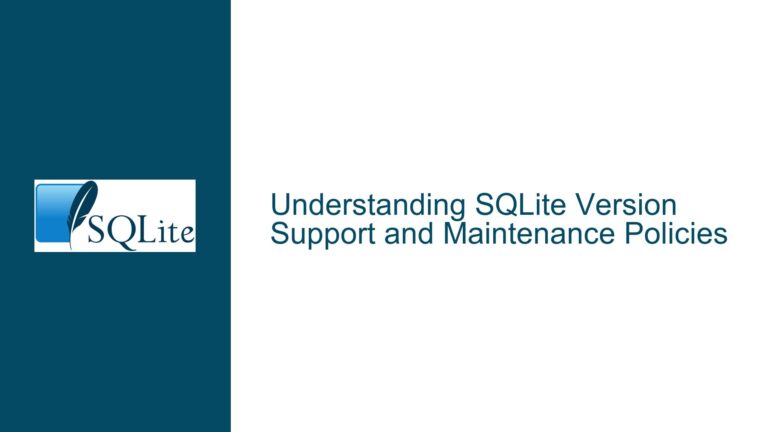Compiling SQLAR Fails Due to SQLite3 Misleading Indentation Errors
Outdated SQLite Amalgamation Triggers Compiler Warnings as Errors
Issue Overview
The core problem arises when attempting to compile the SQLite Archiver (SQLAR) tool from its Fossil repository. The build process fails during compilation of the bundled sqlite3.c file with specific errors related to misleading indentation in the SQLite codebase. These errors are treated as fatal due to the -Werror flag in the build configuration, halting the compilation process. The issue is resolved by replacing the repository’s included sqlite3.c and sqlite3.h files with those from a newer SQLite amalgamation (e.g., sqlite-autoconf-3380300). This scenario indicates a version mismatch between the SQLite code bundled with SQLAR and modern compiler expectations around code formatting and warning handling.
The error manifests in two specific locations within sqlite3.c:
- Line 103150: The
ifclause modifyinga[0]is followed by anassertstatement on the same line, creating ambiguous indentation. - Line 103151: A similar pattern where an
ifclause andassertare placed consecutively without proper block delineation.
The compiler interprets these constructs as potential code structure ambiguities, triggering the -Werror=misleading-indentation warning (promoted to an error). The SQLAR project’s Makefile enforces strict warning handling, making the build process sensitive to even minor code formatting issues in dependencies like SQLite.
Root Causes of Compilation Failure
Three primary factors contribute to this compilation failure:
Aging SQLite Amalgamation in SQLAR Repository
The SQLAR Fossil repository includes a version ofsqlite3.candsqlite3.hdating back to a 2018 checkout (as evidenced by the Fossil metadata). This corresponds to SQLite versions prior to 3.24.0 (2018-06-04). Older SQLite amalgamations contain code formatting patterns that modern GCC versions (post-6.0) flag under the-Wmisleading-indentationwarning category. The SQLite codebase has since been updated to address these formatting concerns, but the SQLAR repository has not refreshed its bundled amalgamation files.Compiler Flag Strictness in Makefile
The SQLAR Makefile enables-Wall -Werror, which treats all warnings as errors. While this promotes code quality, it creates brittleness when compiling older third-party code like SQLite. The-Wmisleading-indentationwarning (introduced in GCC 6) did not exist when the SQLAR repository’s SQLite version was last updated, leading to incompatibility with modern toolchains.Ambiguous Code Formatting in Legacy SQLite Functions
The offending code insqlite3DefaultRowEst()uses a condensed coding style whereifstatements andassertcalls are placed on the same line without braces. For example:if( pIdx->pPartIdxWhere!=0 ) a[0] -= 10; assert( 10==sqlite3LogEst(2) );This structure is technically valid but visually misleading, as the
assertappears to be part of theifblock due to indentation. Modern GCC versions interpret this as a potential developer mistake and emit a warning.
Resolving Compilation Errors via Amalgamation Updates and Build Adjustments
Step 1: Verify SQLite Amalgamation Version
Identify the SQLite version bundled with SQLAR by checking the sqlite3.c header or Fossil metadata:
grep "SQLITE_VERSION" sqlite3.h
# Output example: #define SQLITE_VERSION "3.22.0"
Versions prior to 3.24.0 are likely to trigger this issue. Compare this with the latest amalgamation from SQLite Download Page.
Step 2: Update SQLite Amalgamation Files
Replace the outdated sqlite3.c and sqlite3.h with those from a newer amalgamation:
# Example using sqlite-autoconf-3380300 (SQLite 3.38.3)
cp /path/to/sqlite-autoconf-3380300/sqlite3.c .
cp /path/to/sqlite-autoconf-3380300/sqlite3.h .
Post-Update Verification:
Recompile SQLAR using make. The updated SQLite code should resolve indentation warnings, allowing successful compilation.
Step 3: Modify Compiler Flags (Temporary Workaround)
If updating SQLite is undesirable (e.g., for compatibility testing), adjust the Makefile to suppress specific warnings:
# Original CFLAGS line
CFLAGS = -g -I. -D_FILE_OFFSET_BITS=64 -Wall -Werror
# Modified to disable -Werror and -Wmisleading-indentation
CFLAGS = -g -I. -D_FILE_OFFSET_BITS=64 -Wall -Wno-error=misleading-indentation
Trade-offs: This approach allows the build to proceed but masks potential code issues. Use only for testing or legacy environment support.
Step 4: Patch Legacy SQLite Code (Advanced)
For scenarios requiring retention of the original SQLite version, manually patch the misleading indentation in sqlite3.c:
// Original problematic lines
if( pIdx->pPartIdxWhere!=0 ) a[0] -= 10; assert( 10==sqlite3LogEst(2) );
// Corrected formatting with explicit braces
if( pIdx->pPartIdxWhere!=0 ) {
a[0] -= 10;
}
assert( 10==sqlite3LogEst(2) );
Caution: Manual patching of amalgamated code is error-prone. Validate changes against SQLite’s official code revisions.
Step 5: Update SQLAR Repository Configuration
Advocate for updating the SQLAR Fossil repository to reference a newer SQLite amalgamation. This involves:
- Testing SQLAR functionality with recent SQLite versions.
- Submitting a patch to the SQLAR maintainers.
- Adjusting Fossil build instructions to fetch SQLite dynamically if bundling is discouraged.
Step 6: Cross-Compiler and Environment Analysis
If failures persist, audit the build environment for factors like:
- GCC Version: Test with GCC 6+ versus older compilers.
- POSIX Compliance Flags:
-D_FILE_OFFSET_BITS=64may interact with large file support in older SQLite versions. - Preprocessor Definitions:
-DSQLITE_THREADSAFE=0and-DSQLITE_OMIT_LOAD_EXTENSIONcould alter internal SQLite code paths.
Step 7: Dependency Management Integration
For long-term stability, integrate SQLAR with a package manager or build system that fetches SQLite dependencies at compile time. Example using make:
SQLITE_AMALGAMATION_URL = https://sqlite.org/2022/sqlite-autoconf-3380500.tar.gz
download_sqlite:
wget $(SQLITE_AMALGAMATION_URL)
tar -xzf sqlite-autoconf-3380500.tar.gz
cp sqlite-autoconf-3380500/sqlite3.c .
cp sqlite-autoconf-3380500/sqlite3.h .
This ensures the build always uses a recent SQLite version, mitigating version drift issues.
Conclusion
The SQLAR compilation failure stems from incompatibilities between older SQLite code formatting practices and modern compiler diagnostics. By updating the SQLite amalgamation, adjusting compiler flags, or patching legacy code, developers can resolve the misleading indentation errors. Proactive dependency management and periodic updates to bundled third-party code are critical for maintaining buildability in projects like SQLAR. For community-driven tools, contributing patches back to upstream repositories ensures long-term compatibility and reduces friction for future users.
